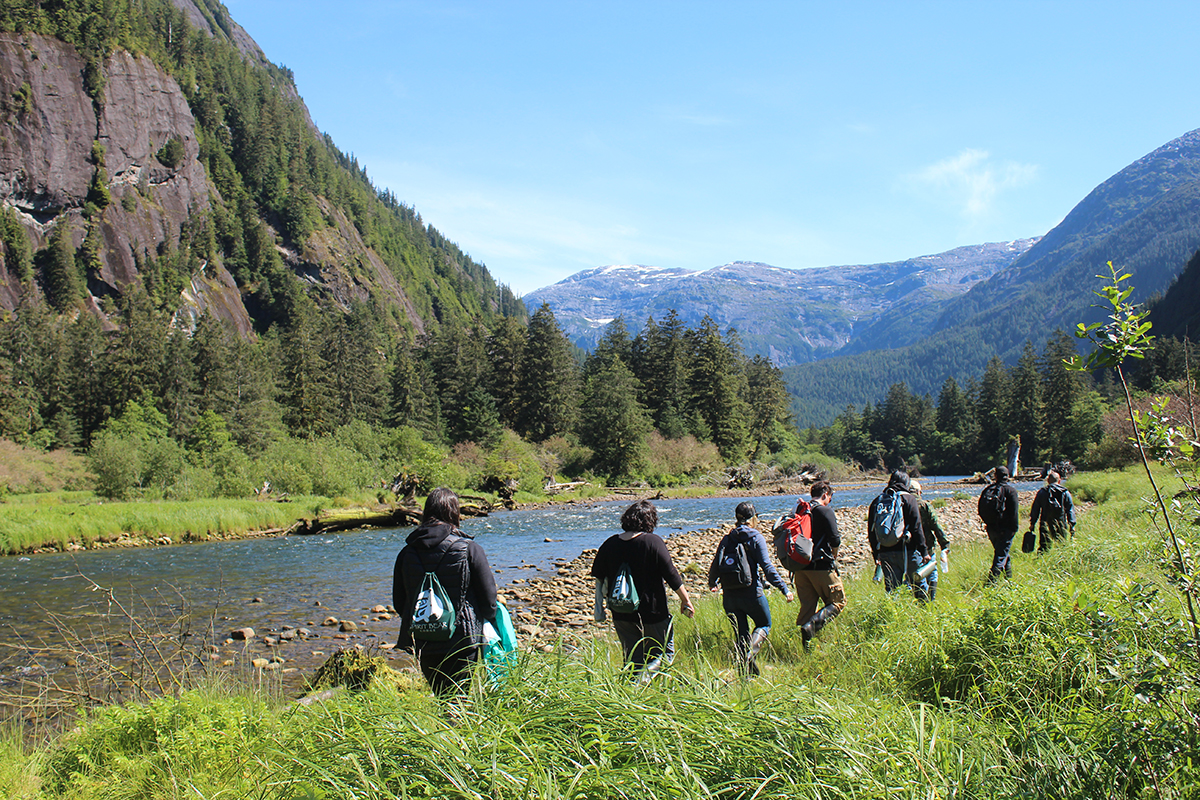We recently invited our partners from Inuit Nunangat to meet our partners in Klemtu and Bella Bella, British Columbia to create connections and inspire ideas through a peer-to-peer learning exchange. Our partners in BC have launched exciting integrated eco and cultural tourism endeavours, land and marine stewardship programs, and community well-being initiatives that can help inform similar models in the Canadian North. Sara Hsiao of Tides Canada’s Strategic Grantmaking team shares her experiences and reflections from the trip.
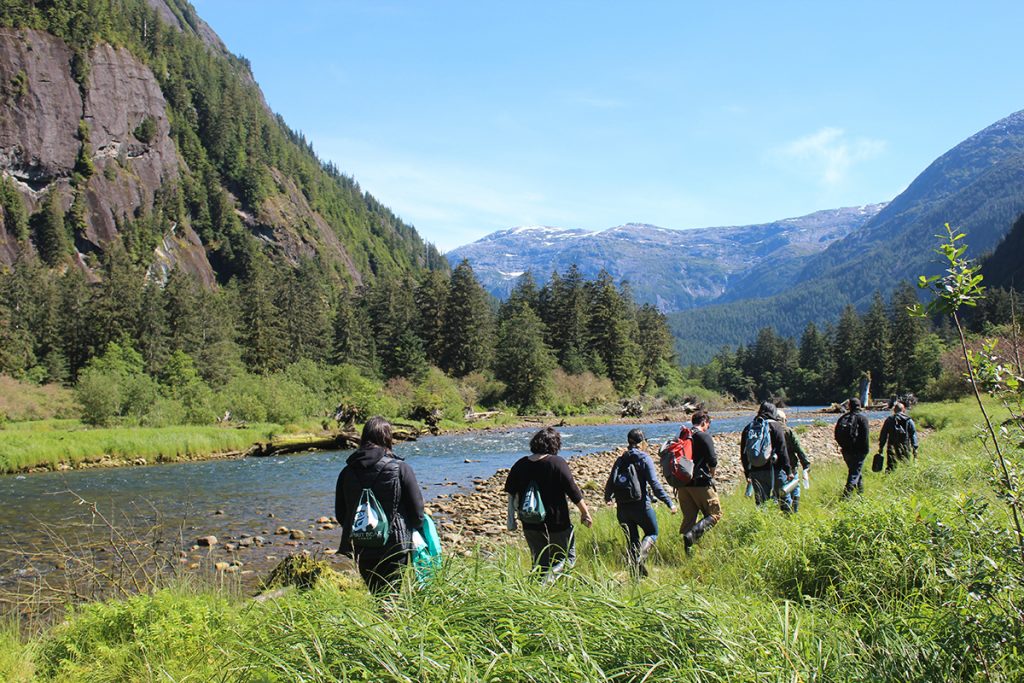
In the traditional territories of the Kitasoo/Xai’xais and the Heiltsuk First Nations on the central coast of BC exist people and lands with long shared histories of living in ways that have promoted healthy cultures, communities, and environments. More recently, there have been periods when resource development has infringed upon the rights of First Nations, their relationship with the land, and the sustainability of ecosystems. But for decades now, the Kitasoo/Xai’xais and Heiltsuk First Nations, amongst others, have shown determination and a wise humility in asserting their rights and challenging colonial systems to better respect the people and unique landscapes of BC’s central Pacific coast.
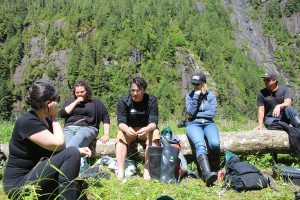 In early summer, Tides Canada organized a learning trip to bring partners from the North to meet our BC coast partners. The goal of the trip was for our Northern partners to learn from the experiences of the Kitasoo/Xai’xais and Heiltsuk people in building land and resource protection management plans and improving community well-being in Klemtu and Bella Bella. These types of community-to-community learning exchanges help catalyze ideas, share lessons learned across geographies, and build wide networks of supportive people doing similar work.
In early summer, Tides Canada organized a learning trip to bring partners from the North to meet our BC coast partners. The goal of the trip was for our Northern partners to learn from the experiences of the Kitasoo/Xai’xais and Heiltsuk people in building land and resource protection management plans and improving community well-being in Klemtu and Bella Bella. These types of community-to-community learning exchanges help catalyze ideas, share lessons learned across geographies, and build wide networks of supportive people doing similar work.
Our partners from the North were from Inuit Nunangat, the homeland of Inuit in Canada. Specifically, they represented partners from the Ittaq Heritage and Research Centre and the Mittimatalik Hunters and Trappers Organization on Baffin Island, Nunavut, and the Nunatsiavut Government in Northern Labrador. These Northern partners are in the process of strategizing and planning ways to promote land and marine stewardship and support healthy families, sustainable livelihoods, and leadership. In the face of climate change, resource development pressures, and a history of colonization in Inuit Nunangat, creative, community-led solutions were what these Northern partners hoped to be inspired with from a visit to Klemtu and Bella Bella.
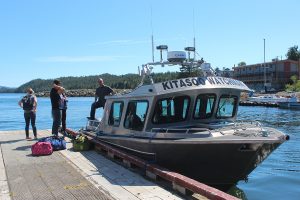 Our Kitasoo/Xai’xais and Heiltsuk hosts were so generous and hospitable with their time, knowledge, and willingness to share with us. I was impressed with all the organizations that we visited and spent time with. The Spirit Bear Lodge was professional and offered a great range of cultural and ecotourism options. We experienced cultural storytelling, were encouraged to join dancing and drumming activities, and were taken out for a hike in a remote part of the Kitasoo/Xai’xais territory, where we were lucky to watch a couple of grizzly bears and other wildlife.
Our Kitasoo/Xai’xais and Heiltsuk hosts were so generous and hospitable with their time, knowledge, and willingness to share with us. I was impressed with all the organizations that we visited and spent time with. The Spirit Bear Lodge was professional and offered a great range of cultural and ecotourism options. We experienced cultural storytelling, were encouraged to join dancing and drumming activities, and were taken out for a hike in a remote part of the Kitasoo/Xai’xais territory, where we were lucky to watch a couple of grizzly bears and other wildlife.
While on the land, we also learned of the scope and rigour of research, planning, and advocacy of the Coastal Guardian Watchmen, the Kitasoo/Xai’xais Integrated Resource Authority, and the Heiltsuk Integrated Resource Management Department. The work of these organizations is holistic. An example of this was learning how bear health data is collected and analyzed by local researchers to advocate for stronger protection of wildlife and the ecosystem as a whole; and how communities are subsequently empowered economically and culturally through better protection of their territories. The dedication and vision of the Qqs Project Society was also inspiring, especially when we felt the healing atmosphere and learned of the programs of Koeye Lodge. Tides Canada has supported diverse elements of the work of these organizations over the years, so it was a special experience to see their work in action, and also to see sparks of ideas from our fellow travelers on how aspects of this work could be applied in their own communities in the North.
Trip attendees were energized from learning about the evolution of these coastal entities and how they work together to engage, empower, and employ community members, to build viable economies that prioritize conservation, and to co-govern environmental management plans. Many enthusiastic conversations were had on the art of the possible in Inuit Nunangat. Natasha Mablick-Simonee, Manager of the Mittimatalik Hunters and Trappers Organization in Pond Inlet, described it as seeing opportunities with “new eyes.”
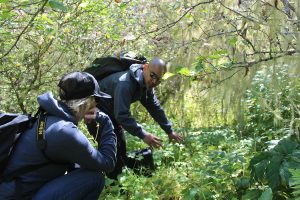 During this trip, partners across the North and Pacific embraced shared learning, broached tough topics, and had fun together–all of which built trust and will enrich the actions we take next to support these communities in advancing local conservation and community well-being. The advice from Doug Neasloss, the elected Chief Councillor and Resource Stewardship Director of the Kitasoo/Xai’xais First Nation, was that networking and bringing people together is the most important thing you can do to reach your goals. Additionally, a key takeaway was the significance of honouring traditions and recognizing the strengths of community members, especially youth.
During this trip, partners across the North and Pacific embraced shared learning, broached tough topics, and had fun together–all of which built trust and will enrich the actions we take next to support these communities in advancing local conservation and community well-being. The advice from Doug Neasloss, the elected Chief Councillor and Resource Stewardship Director of the Kitasoo/Xai’xais First Nation, was that networking and bringing people together is the most important thing you can do to reach your goals. Additionally, a key takeaway was the significance of honouring traditions and recognizing the strengths of community members, especially youth.
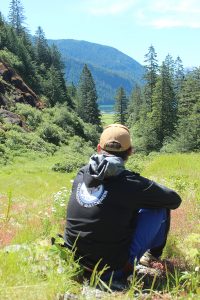 Being able to learn firsthand from the leaders and community members in Klemtu and Bella Bella, as well as experiencing the beautiful places and the warmth of the communities, highlighted the value of relationship building between partners and the importance of having deep learning opportunities. Tides Canada aims to continue using learning trips as unique opportunities of reciprocity and collaboration to push the boundaries on community-led solutions and build on successes from allies across the country.
Being able to learn firsthand from the leaders and community members in Klemtu and Bella Bella, as well as experiencing the beautiful places and the warmth of the communities, highlighted the value of relationship building between partners and the importance of having deep learning opportunities. Tides Canada aims to continue using learning trips as unique opportunities of reciprocity and collaboration to push the boundaries on community-led solutions and build on successes from allies across the country.
Learn more and support the important work of these communities on the Pacific Coast and in the Canadian North to help build a future that is healthy, equitable, and prosperous for all Canadians.
